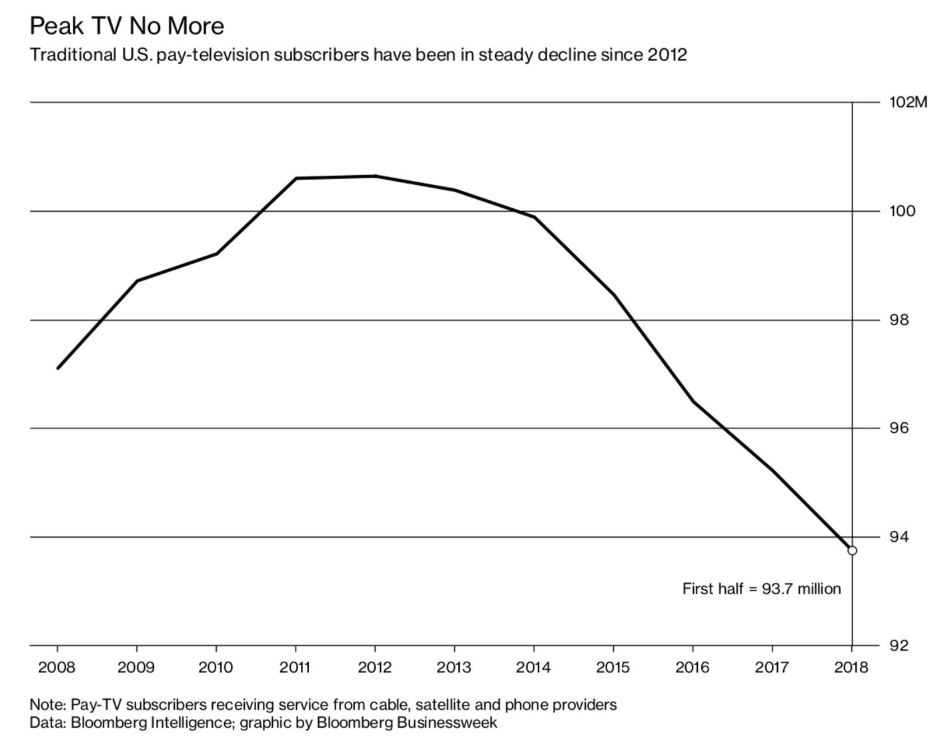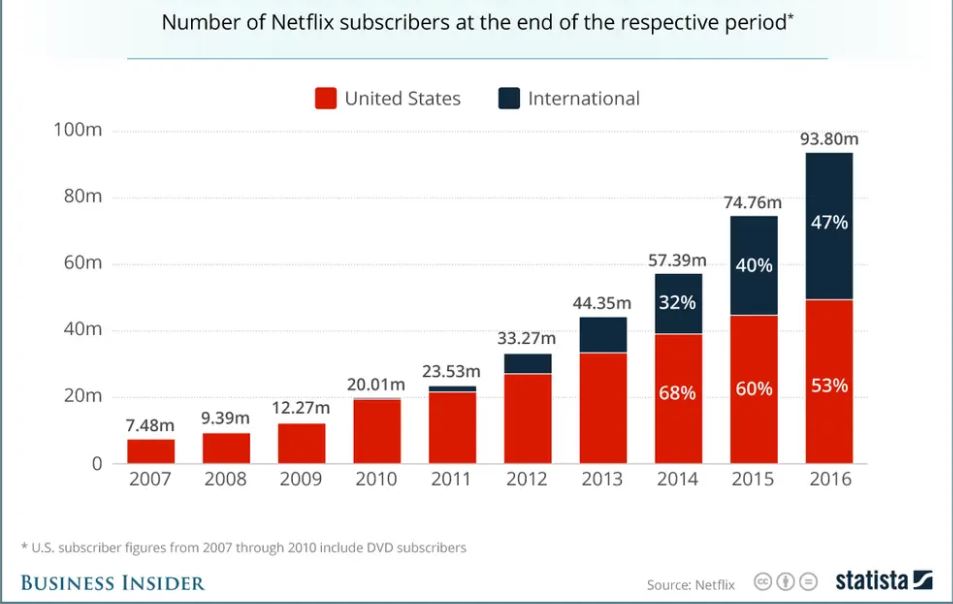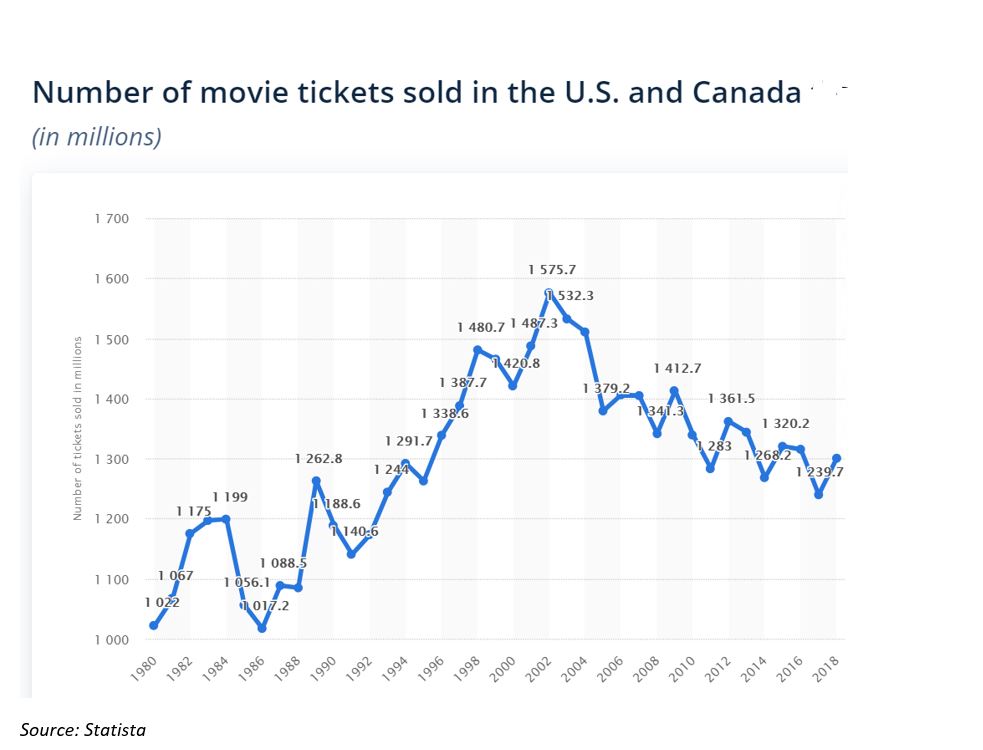Why Netflix is winning the entertainment battle

Why the rise of Netflix has changed the landscape in the entertainment industry for producers distributors and consumers of content, and what has been Netflix competitive advantage that enabled it to disrupt a 100 year old industry.
Netflix is a company that has a history of being a disruptor to incumbents ever since its launch back in 1997. It started as a DVD by mail service that competed with traditional rentals such as the giant Blockbuster. However, the founder, Reed Hastings, had plans for Netflix to become a streaming service long before the idea was economically or technically viable. It even pitched the idea to Blockbuster, offering to build their streaming service in exchange for a cash infusion and 49% of the company, an offer that the rental giant refused. They filed for bankruptcy in 2010.
When Netflix launched its streaming service in 2007 it did it by acquiring content produced by different studios, mostly for movies that had already had a theatrical release and for TV shows that had either already finished or that when still being aired, although with a large window to their first time air date on network TV. However, even though Netflix didn’t have a first window right into any of its programming, it provided, and still to this day provides, a more convenient alternative to traditional cable TV to many uses at a much lower cost. This can be seen in how the number of pay TV subscribers in the US has evolved over the past 10 years. It has been steadily decreasing since 2012, while the number of Netflix subscribers has been steadily increasing in the same time period.
The reason behind this shift from pay TV into streaming platforms, mainly Netflix, can be attributed to, as was mentioned before, simply a better user experience, at a better price. Netflix gives the users the ability to consume content at their own pace. When they want and how they want. They can watch through the entire thing at once or in more than one sit in. Additionally, users don’t have to sit through commercials which not only makes for a worse user experience, but also increases the overall amount of time that a user has to sit through to consume a movie or a TV episode. This is not only important because of how much better the experience is for user, but also because of what it implies. The fact that Netflix doesn’t get any revenue from traditional advertising, means that they can acquire and develop content that caters to everyone and that makes for a complete user experience. They are not tied to develop content that targets an advertiser’s target audience.
This characteristic became particularly important in 2013 when Netflix started developing original content. The freedom from not being tied to any advertisers demands gave them the ability to develop whatever type of content they wanted. Additionally, the fact that it is a streaming service, and not a traditional TV channel, with a fixed time slot and calendar days to be filled with content, meant that things could be developed just considering what would constitute the best creative output. It seasons had to be 9 episodes instead of 8, if episodes needed to be 52 minutes instead of 44, it wasn’t a problem. These made it easier both to attract talent because of the creative liberties that they had. And last, by then, Netflix had amassed such a huge quantity of data on viewing patterns, what people liked and which target segments consumed which type of content, that they could develop titles specifically catered to whichever segment they chose to target.
This growth in streaming service is not only disrupting the TV industry, which as we showed has seen a steady decrease of Pay subscribers in the last years, but it is also impacting the number of people who chose to go to the traditional cinema. Even though this may be mascaraed by the total box office gross due to rising ticket prices, total admissions (as in number of tickets sold) have also been steadily decreasing in the US since the boom of home content consumption alternatives.
Traditional companies have been reacting to this trend as well. A lot of them have started pulling content from Netflix in the hopes of decreasing the power of the streaming giant, and also as preparation for the launch of their own direct to consumer alternative to compete in the streaming industry as well. This has led to the start of what is being called the “Streaming Wars”. This includes companies like Disney with their Disney + service, NBC with Peacock or Warner also launching their own service combined with HBO. However, these are not the only companies that have entered the space. Tech giants like Amazon and Apple have also created their own platform and are producing original content in the hopes to compete against Netflix.
The landscape for producers, distributors and consumers of media and entertainment has changed more rapidly in the last year than ever before, largely thanks to the rise of Netflix. Traditional and new players are ramping up to compete head to head and the landscape looks more crowded every day. Netflix definitely changed the way the industry operates and is winning the battle against both incumbents and new players.






Thank you for this interesting post, Miguel!
Although I completely agree that Netflix has been a critical catalyst to the entertaining industry and has been for sure a winner on the last decade for consumers’ eye balls, I wonder if the company has a solid strategy to keep that position. I feel that as the competitors recover from the initial shock from Netflix’s disruptive business model they are starting to deploy strategies that put Netflix’s model into question.
Lets take Disney, for example. With the roll-out of their platform strategy with exclusive content, they suddenly not only become a formidable competitor to Netflix, capable of producing high quality content (recorded and live, through ESPN, which Netflix cant compete with), but weakens Netflix’s position as a one stop shop. When you factor in that other large content providers are slowly moving away from Netflix and new competitors keep coming into play, I wonder if Netflix will be able to have enough differentiation to keep its market position. Moreover, if incumbents start to get closer to Netflix, their scale will probably benefit them, as they have more financial resources and Netflix is currently burning over USD 3 billion annually.
Very cool – this is still an evolving market and it will be exciting to see if NFLX maintains its position, fending off competitors who are also throwing money at their own platforms. It will also be interesting to see how, if at all, native advertising (e.g., NFLX partnerships embedded in Stranger Things) might impact creatives/content development.
Thanks for sharing this! I think Netflix has done a fantastic job with their product. They’ve really excelled at personalization and keeping a steady stream of new content coming in throughout the year. Your point about the creative freedoms as it relates to number of episodes and length completely hits the nail on the head and allows for a really diverse set of content on the platform.
In the wake of the streaming wars, I’m really curious to see how Netflix adapts their strategy. Earlier today I saw that Netflix is releasing one of their original movies to non-subscribers so that they can watch before the sequel comes out later this week! Seems like an interesting tactic to get non-subscribers a taste of what Netflix original content is like.
Great post! Netflix did indeed change the media landscape.
As you mentioned, Netflix has amassed huge amounts of data on its customers. It is interesting to see how they are using this data for multiple use cases such as for content development as you mentioned, as well as for content selection (e.g. green light, etc.), next-best product recommendations, customer retention, etc. I would be interested to see how they plan to push the barriers on that front.
In addition, it would be interesting to see how they plan to incorporate other digital technologies that could be impacting media such as virtual reality and augmented reality. They have already started experimenting with these (e.g. AR app for Stranger things, VR with Black Mirror) – looking forward to see how they innovate further on that front before they get disrupted.